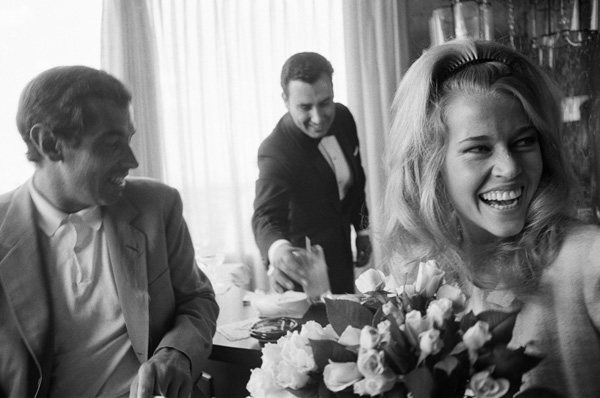Even a major event such as the Cannes Film Festival has competition for the public’s attention. This year, the dates have been moved a week earlier in the calendar. It’s not a radical time shift, to the sure, but one that will potentially increase media coverage, at least in France and the rest of Europe, away from other spotlight-stealing spectacles.
Usually the Monaco Grand Prix overlaps with Cannes, as does the gaudy, guilty pleasure of the Eurovision Song Contest. Cannes will be a thing of past when the race takes off on May 27, and the latter audience-grabber will now culminate in the middle of the fest, as opposed to its final weekend, so the festival may have the playing field all to itself at the end. Interestingly, when artistic director Thierry Frémaux announced the change of dates, no explanation was offered for the move, except for the acknowledgement that it was the beginning of a new era.
Another 2018 change is that the films in the competition will not be screened for critics beforehand, an adjustment caused by the digital age. Since the rise of Twitter, off-the-cuff, 140-character sound bites have immediately impacted a film’s reception. It wasn’t uncommon for a director and cast members to be parading on the red carpet knowing that their film had been slaughtered by the critics; no amount of haute couture can hide the stench of a stink bomb. What time critics actually see a film is likely a small matter in the long run and one of little concern to the public, but it will be telling to see how it tampers with the mood on the ground level. (I imagine reenactments of The Day of the Locust as reviewers fight to get into a genuine world premiere.)
The jury that gives out the awards in the main competition will be headed by actress Cate Blanchett. She will be joined by actors Chen Chang, Léa Seydoux, Kristen Stewart; directors Ava DuVernay, Robert Guédiguian, Denis Villeneuve, Andrey Zvyagintsev; and musician Khadja Nin. Among those whose work they will consider for the Palme d’Or prize, half will be newcomers to the official competition.
One filmmaker is bound to receive media attention, thanks to the international platform that the festival provides: Russia director Kirill Serebrennikov. He has been under house arrest since October 2017 for supposedly committing fraud against the Russian government, and has been critical of the annexation of Crimea and a public supporter of LGBT rights. So, no, he is not expected to be allowed to travel to the Riviera for the screening of his new film, the rock ’n’ roll–themed The Summer (Leto), which takes place in Leningrad during the early days of Perestroika.
An earlier film of his competed at the Venice Film Festival in 2012: The Betrayal, a sleek allegorical bubble that did not receive a lot of festival play. His follow-up, The Student, was selected for Critics’ Week at Cannes in 2016. The difference in tone and purpose between the two works is remarkable. A slowly engrossing character study, The Student centers on an alienated teenage boy, raised by a single mother, who dives head-first into ultra-nationalism and strict Eastern Orthodox theology. Serebrennikov scrutinized the alt-right before the term became part of everyday speak.
Serebrennikov isn’t the only director competing at Cannes who has been imprisoned by authorities. Jafar Panahi has been under house arrest since 2010 for his alleged propaganda against the Iranian government and banned from filmmaking. Nevertheless, he has continued to do so, and in fact, his Taxi, from 2015, won Berlin’s Golden Bear. (Panahi has been making his films with his iPhone. How they have been smuggled out of Iran has the makings of a riveting movie.) Thus, it’s highly unlikely that he will be attending the world premiere of his 3 Faces, despite the festival’s pleas to Iran to allow Panahi to travel.
Arguably the best-known and acclaimed Iranian filmmaker today, Asghar Farhadi, opens the festival by way of his made-in-Spain Everybody Knows, featuring star couple Penélope Cruz and Javier Bardem. The only other film that he made outside of Iran was the French-language drama The Past, which earned actress Bérénice Bejo the Best Actress Award in Cannes five years ago. Meanwhile, his last film, The Salesman, premiered on the Croisette and won the Best Screenplay and Best Actor awards in 2016, before winning the Oscar for best foreign-language film. His new drama is kicking off this year’s competition as well.
It appears promising that this premiere might break what is considered the Cannes opening night curse, in which the very first film screened is often upstaged immediately by other, and better, movies. Last year, Ismael’s Ghosts met to a decidedly mixed reception. Though glitzy and with big name stars, Baz Luhrmann’s The Great Gatsby anticlimactically kicked off Cannes after already opening internationally and premiering in France the same day as the 2013 festival began. Of other recent openers, 2014’s Grace of Monaco, starring Nicole Kidman, is the most derided. It never opened theatrically in the United States and went straight to the Lifetime channel.
Cannes is not known for its strong documentary lineup, but often in the Cannes Classics section can be found the best nonfiction the programmers have to offer. Jane Fonda is a red carpet regular and an ambassador for festival sponsor L’Oréal, and sometimes she actually has a film in the program, as was the case with Youth (2015). With a running time of 133 minutes, Susan Lacy’s Jane Fonda in Five Acts will hopefully give the actress/activist/entrepreneur the in-depth biography she deserves.
The question is, what are the five acts of Fonda’s varied career: the 1960s ingénue; her French period with then-husband Roger Vadim; her anti-Vietnam War activism; her strong run as star/producer in the 1970s and 1980s; the Born Again wife of Ted Turner; or her latest resurgence, where she seems to be everywhere, including on Netflix (Grace and Frankie) and the multiplex (Book Club)? The biography will air on HBO later this year.
The inclusion of a particular documentary in the Cannes Classics section is yet another reminder of when women were among the leading filmmakers of the silent film era and pioneers in many fields in the first decades of the movies. In Be Natural: The Untold Story of Alice Guy-Blaché, Pamela B. Green profiles the French-born director who is considered to have made the first narrative film, The Fairy of the Cabbages, also called The Birth of Infants, back in 1896 for France’s Gaumont Film Company. Blaché went on to found her own studio, based in Fort Lee, New Jersey.
The Cannes Film Festival runs from May 8 to May 19.








Leave A Comment